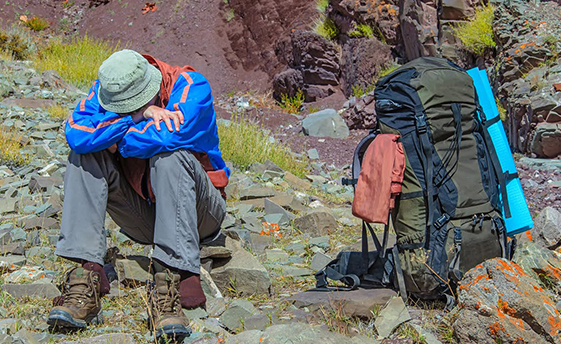Altitude sickness is a common condition that can occur when you climb to a high altitude too quickly. Most cases are mild, with symptoms that can include: headache, nausea, dizziness and exhaustion.
If you have mild symptoms of altitude sickness, you shouldn’t go any higher for at least 24 to 48 hours.
Book an AppointmentAltitude Sickness
Altitude sickness is fairly common among those who spend time at high altitudes, such as mountaineers and skiers. There is no specific factor, such as age, sex or physical fitness, that increase a person’s likelihood of getting altitude sickness. Certain people are affected, while others are less susceptible to it.
In its mildest form, altitude sickness can occur at heights over 2,500 metres above sea level. However the more severe symptoms of altitude sickness tend to occur at altitudes of 3,600metres (about 12,000 feet) and above.
In rare cases, altitude sickness can cause fluid to build up either on the lungs or the brain. These are very serious conditions and require immediate medical attention. Symptoms of severe sickness can include: a bubbling sound in the chest; worsening breathlessness; coughing up pink, frothy liquid; clumsiness and difficulty walking and confusion leading to loss of consciousness.
If you have mild symptoms of altitude sickness, you shouldn’t go any higher for at least 24 to 48 hours. You can continue to climb if your symptoms improve after this. If your symptoms get worse or don’t improve after 24 to 48 hours, you should descent by at least 500 metres. Severe altitude sickness is a medical emergency. Anyone with severe symptoms should immediately descend to a low altitude and seek medical help.
In order to prevent altitude sickness proper acclimatisation to altitudes about 2,500 metres (just over 8,200 feet) or more is the best way to prevent altitude sickness. It usually takes a few days for the body to get used to a change in altitude. Ascending slowly will give your body time to adapt to the change in altitude. Keeping hydrated is also important, but it is also important to avoid alcohol.
For more information click the link below:
https://www.fitfortravel.nhs.uk/advice/general-travel-health-advice/altitude-and-travel


